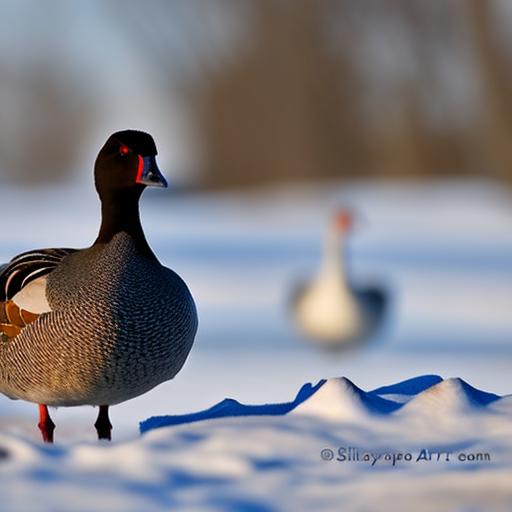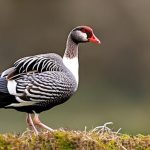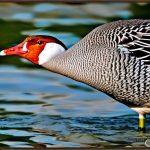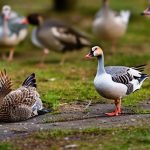Taking care of geese during the winter months is crucial to ensure their health and well-being. Geese are resilient birds, but they still require special attention during the cold winter season. Factors such as shelter, bedding, ventilation, diet, hydration, protection from frostbite and hypothermia, heat sources, and monitoring their health all play a significant role in keeping geese safe and comfortable during winter.
Key Takeaways
- Geese need shelter, bedding, ventilation, nutrition, hydration, and protection from cold weather.
- Adequate shelter should protect geese from wind, rain, and snow, and provide enough space for them to move around.
- Bedding material should be absorbent, dry, and easy to clean, such as straw or wood shavings.
- Proper ventilation is important to prevent moisture buildup and respiratory problems.
- A nutritious winter diet should include grains, vegetables, and protein sources, and fresh water should be available at all times.
Understanding the Winter Needs of Geese
Geese have natural behaviors that help them adapt to the cold weather. They have a thick layer of down feathers that provide insulation and keep them warm. Geese also have the ability to fluff up their feathers to trap air and create an additional layer of insulation. They may also huddle together to conserve body heat. Additionally, geese have a unique circulatory system that allows them to reduce blood flow to their extremities in order to conserve heat.
Providing Adequate Shelter for Your Geese
Having a shelter for geese during winter is essential for their protection against harsh weather conditions. The shelter should be well-insulated and provide enough space for the geese to move around comfortably. It should also be draft-free and have proper ventilation to prevent the buildup of moisture and ammonia. There are different types of shelters that can be used for geese, such as barns, sheds, or specially designed goose houses.
Choosing the Right Bedding Material for Your Geese
Choosing the right bedding material for your geese is important for their comfort and health. Straw is a commonly used bedding material as it provides insulation and absorbs moisture well. However, it can become compacted over time and may need to be replaced frequently. Wood shavings or wood chips are another option that provides good insulation and absorbs moisture effectively. However, they may need to be replenished more often than straw.
Ensuring Proper Ventilation in Your Geese’s Housing
Proper ventilation in your geese’s housing is crucial to prevent the buildup of moisture and ammonia, which can lead to respiratory issues. Ventilation also helps regulate the temperature inside the shelter and prevents condensation. There are several ways to ensure proper ventilation, such as installing windows or vents that can be opened or closed as needed. It is important to strike a balance between providing enough fresh air and avoiding drafts.
Feeding Your Geese a Nutritious Winter Diet
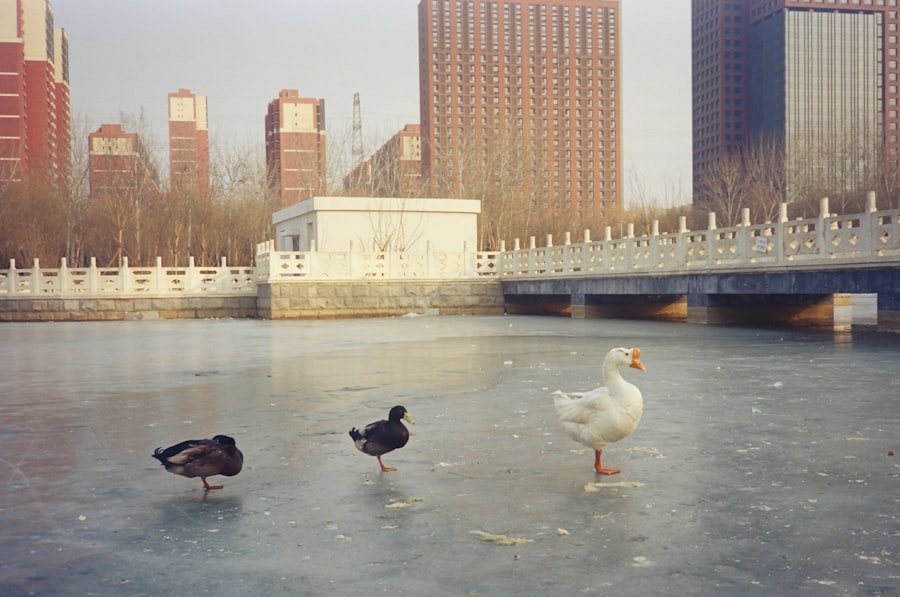
Feeding geese a nutritious diet during winter is essential to keep them healthy and maintain their energy levels. A balanced diet should include a mix of grains, such as corn, wheat, and barley, as well as protein sources like soybean meal or fish meal. It is also important to provide them with fresh greens, such as kale or spinach, to supplement their diet. Additionally, offering a calcium source, such as crushed oyster shells, can help prevent eggshell problems.
Keeping Your Geese Hydrated in the Winter Months
Keeping geese hydrated during winter is crucial as they still require water for digestion and overall health. However, providing open water can be challenging when temperatures drop below freezing. One option is to use heated waterers that prevent the water from freezing. Another option is to provide warm water multiple times a day and remove any ice that forms in their water containers.
Protecting Your Geese from Frostbite and Hypothermia
Geese are susceptible to frostbite and hypothermia during winter, especially in extreme cold conditions. To protect them from frostbite, it is important to keep their feet dry and provide them with proper bedding material that insulates against the cold ground. Protecting them from hypothermia involves providing adequate shelter, ensuring proper ventilation, and offering heat sources when necessary.
Providing Heat Sources for Your Geese
In extremely cold weather, providing heat sources for your geese can help keep them warm and prevent health issues. Heat lamps or infrared heaters can be used to provide additional warmth in their shelter. However, it is important to use caution when using heat sources to avoid fire hazards and ensure that the geese have enough space to move away from the heat if needed.
Monitoring Your Geese’s Health during the Winter
Monitoring your geese’s health during winter is crucial to catch any signs of illness or distress early on. Keep an eye out for symptoms such as lethargy, loss of appetite, coughing, sneezing, or changes in behavior. Regularly check their feet for signs of frostbite and ensure that they are maintaining a healthy weight. If you notice any concerning signs, consult a veterinarian who specializes in poultry.
Preparing Your Geese for Winter Months in Advance
Preparing your geese for winter months in advance is important to ensure a smooth transition into the colder season. This can include gradually acclimating them to lower temperatures by reducing the temperature in their shelter over time. It is also important to provide them with a balanced diet and ensure that they are in good health before winter arrives.
Taking care of geese during the winter months requires attention to various factors such as shelter, bedding, ventilation, diet, hydration, protection from frostbite and hypothermia, heat sources, and monitoring their health. By providing adequate care and attention to these aspects, you can ensure that your geese stay healthy and comfortable throughout the winter season. Remember to always prioritize their well-being and consult a veterinarian if you have any concerns or questions.
If you’re looking for ways to keep your geese warm during the winter months, you might also be interested in this article on large chicken coop ideas from Poultry Wizard. A well-insulated and spacious coop can provide a cozy shelter for your geese, ensuring they stay comfortable and protected from the cold weather. Additionally, Poultry Wizard offers valuable insights on using a heater for a chicken coop, which can be adapted to keep your geese warm as well. Check out their article on chicken coop ideas in Grand Island, NE for more tips and tricks to keep your feathered friends snug and happy all winter long. (source)
FAQs
What temperature range is suitable for geese in winter?
Geese can tolerate temperatures as low as -20°F (-29°C) but they need to be protected from wind and moisture.
What are the signs of hypothermia in geese?
Signs of hypothermia in geese include lethargy, loss of appetite, shivering, and difficulty standing or walking.
What kind of shelter is best for geese in winter?
A dry, draft-free shelter with good ventilation is best for geese in winter. It should be large enough to allow them to move around comfortably and have access to food and water.
What kind of bedding should be used in a goose shelter?
Straw or hay is the best bedding for geese in winter. It provides insulation and absorbs moisture.
How often should geese be fed in winter?
Geese should be fed twice a day in winter. They need a diet that is high in protein and fat to help them stay warm.
What kind of water source should be provided for geese in winter?
Geese need access to clean, unfrozen water at all times in winter. A heated waterer or a bucket of warm water can be used to prevent the water from freezing.
What are some other ways to keep geese warm in winter?
Other ways to keep geese warm in winter include providing them with a windbreak, using heat lamps or radiant heaters, and insulating their shelter.
Meet Walter, the feathered-friend fanatic of Florida! Nestled in the sunshine state, Walter struts through life with his feathered companions, clucking his way to happiness. With a coop that’s fancier than a five-star hotel, he’s the Don Juan of the chicken world. When he’s not teaching his hens to do the cha-cha, you’ll find him in a heated debate with his prized rooster, Sir Clucks-a-Lot. Walter’s poultry passion is no yolk; he’s the sunny-side-up guy you never knew you needed in your flock of friends!

